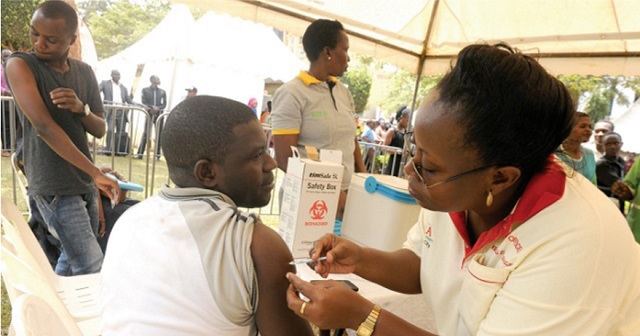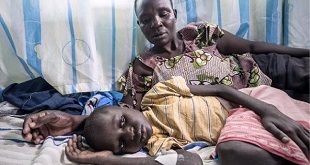
Country leads in tackling growing health challenge
Kampala, Uganda | PATRICIA AKANKWATSA | Up to 6% of people in Uganda are infected with Hepatitis B; a virus that can cause acute and chronic liver infections (cirrhosis) which is incurable.
That means if you are in a place with 15 people; at least one of them, on average, has the infection.It is serious because dying of viral hepatitis in Africa is becoming a bigger threat than dying of AIDS, malaria or tuberculosis.
Similar to HIV, hepatitis B virus is transmitted through unprotected sex, infected blood products and items such as needles, razor blades, dental or medical equipment, unscreened blood transfusions, or from mother to child at birth.
Unfortunately 90% of the infected people do not know it because they do not show any signs of sickness and therefore can easily infect others.
Emma Lutamaguzi was one of them. Although he knew that his dream of working overseas meant he would have to undergo strict medical tests, he was confident he would pass because he felt and looked healthy.
But his dream was shattered when he was diagnosed with Hepatitis B Virus (HBV).
“When the doctor told me, I was a little scared because this is something that I had no idea about,” he says.
The doctor referred him to another doctor who, unfortunately, told him scary stories about the infection.
“He made the situation worse for me,” Lutamaguzi recalls, “He was money oriented.”
The same thing happened when Lutamaguzi told his family and friends about the infection. Some sympathized with him, others thought he was lying because he did not show any sign of sickness and others stigmatized him. He says the stigma did not affect him that much because he had a background of working with people living with HIV.
“I knew they stigmatized me out of ignorance. So I would teach them about the virus and encourage them to test and vaccinate,” Lutamaguzi says.
He was also comforted because the first doctor had told him that his signs were still mild and something could be done to save him.So he continued his search for a more helpful doctor. He also told his story on social media. And that is how he met Kenneth Kabagambe; the executive director of National Organization for People Living with Hepatitis B (NOPLHB).
NOPHLHB is an NGO which provides comprehensive hepatitis information on prevention, care and support services. Lutamaguzi says finding it made him feel comforted. However, the hardest part was changing his lifestyle.
“It was hard quitting alcohol but I had to because the long term effects of Hepatitis B virus is liver cancer,” he says.
He says he now lives a healthy lifestyle, eats healthy and exercises regularly. He says all these are part of treatment.
Risk
The hepatitis virus is present worldwide, but some populations in sub-Saharan Africa, Southeast Asia, Eastern Europe, and the Middle East, as well as in indigenous communities are Hepatitis B carriers.
Every year more than 200 000 people in Africa are dying from complications of viral hepatitis B and C-related liver disease, including cirrhosis and liver cancer. Sixty million people in the WHO Africa Region were living with chronic hepatitis B infection in 2015. More than 4.8 million of them are children under five years old. A further 10 million are infected with hepatitis C, most likely due to unsafe injection practices within health facilities or by communities.
Speaking at the first African Hepatitis summit held last week at Munyonyo, the Minister of Health, Ruth Aceng, viral hepatitis is a growing health challenge in Uganda. It is acquired before the age of five and believed to largely be the result of mother-to-child transmission.
However, Aceng said health workers, the military, persons living with HIV, and commercial sex workers are the adults most prone to Hepatitis B infection.
A new scorecard by WHO launched at the event shows that Uganda is among only three of countries in Africa on track to eliminate the disease. The others are Rwanda and Cabo Verde. Uganda is noted for starting free nationwide hepatitis B treatment, and Rwanda is providing free treatment for both hepatitis B and C. This places them on track to reach the WHO 2020 Framework targets for testing and community awareness.
Only seven out 47 countries are leading prevention efforts. National coverage of both Hepatitis B birth dose and childhood pentavalent vaccination exceeds 90% in these countries. Up to 28 countries have developed a national hepatitis strategic plan but most are still in draft form.
According to the Health ministry, Hepatitis B is more prevalent in the Northern part of the country with 4.6% and lowest in the south west at 0.8%. And of these 4.3% are aged between 15 and 49 years.
Elimination strategy
In 2014, the government acknowledged that hepatitis is a serious health concern, making a public declaration to address it. An estimated $3million of the annual government budget has been earmarked to tackle hepatitis B.
In 2015, the Ministry of Health launched a screening and treatment programme exclusively for hepatitis B targeting those above the age of 15. Those who test negative are given vaccinations as a preventative measure. This effort started in the north where the prevalence is high, followed by the east with the aim of covering the whole country. Since September 2015, over 60 million people have been vaccinated.
However according to Aceng, of those eligible for vaccination, 92% have received the first dose, 68% have received the second dose and only 33% have received the third dose.
“After the first dose, I don’t know what happens. People don’t come back to complete all the doses and yet they are important. I think the World Health Organization (WHO) needs to do more research to make the vaccination period shorter”, she said.
To tackle the prevalence among children, the government introduced a vaccination programme for infants at six weeks after birth. To strengthen this, the Ministry of Health is to start screening all pregnant women as well as introduce a birth dose under which infants receive the first dose within 24 hours after birth to safeguard against mother-to-child transmission.
Challenges
The number one impediment is finance. First, the patients are required to pay for some tests before starting treatment which has resulted into delayed diagnosis.
“We are seeing that most of the patients who are infected are going to hospitals when they are at the end stage of the disease, when it is very advanced”, says Kabagambe.
Another impediment to testing and treating is that diagnostic equipment; especially in rural areas, is often made available through donor funds which do not take into consideration maintenance and other recurrent costs.
“We need to find a way of mobilizing domestic resources because Uganda has limited partners supporting us in this fight, “says Aceng.
Going forward, Ponsiano Ocama the chair of the department of medicine and academic hepatologist at Makerere University says integrating hepatitis services with HIV programmes should be considered.
“There are many similarities between HIV and hepatitis in terms of transmission, disease progression, diagnostic and monitoring equipment required and in some cases treatment too. Globally, between 5% and 20% of the people living with HIV are also infected with Hepatitis B,” Ocama says.
“We are now trying to see the feasibility of having Hepatitis B virus services integrated to the HIV setting. And then if it is feasible, we are trying to assess what kind of additional funding will be required,” he adds.The ministry of health also promises free laboratory tests before treatment.
Hepatitis B quick facts
- Hepatitis B can cause serious liver damage in people with chronic (long term) infections.
- Only 5% of those who are infected as adults will develop serious liver damage called cirrhosis.
- 95% of people infected as adults will clear the virus naturally.
- If you clear the virus naturally during the acute phase, you become immune and cannot be re-infected.
- 95% of people infected as children will go on to develop a chronic infection.
- 25% of those infected as children will develop serious liver damage later in life.
****
 The Independent Uganda: You get the Truth we Pay the Price
The Independent Uganda: You get the Truth we Pay the Price



So touching but keep being strong my dearest cousin Emma Lutamaguzi Kojja…God bless you always darling😍💓😍Much love and care😍💓😍
After I discovered I was Hepatitis B positive, I was on Hepsera for several months. Two years ago, I learnt about a successful HEPATITIS B Virus treatment from Herbal Health Point (ww w. herbalhealthpoint. c om), I was on the treatment for over 7 months and tested negative after I completed the treatment. Its almost unbelievable how the treatment alleviated the virus. I completed the treatment two years ago and still negative!
CAN CHILDREN ALSO BE IMMUNISED AGAINST HEPTITIS B